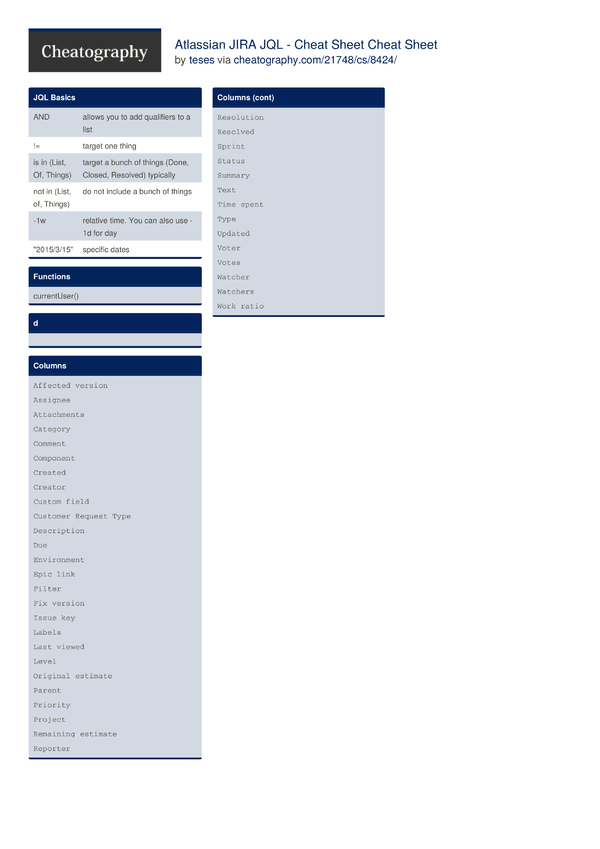- Jira Query Language
- Jira Query Language Cheat Sheet Template
- Jira Query Language Cheat Sheet
- Jira Query Language Cheat Sheet Free
Command Description; TINYINT( )-128 to 127 normal 0 to 255 UNSIGNED. SMALLINT( )-32768 to 32767 normal 0 to 65535 UNSIGNED. MEDIUMINT( )-8388608 to 8388607 normal 0 to 16777215 UNSIGNED. JIRA Query Language (JQL) Filtering. Should you require additional filtering over and above the simple column filters provided in the UI, you can access the JQL interface by clicking the 'Advanced' link. This interface accepts query statements written in JQL, which allows you to create powerful cross-sections of data with relative ease. JQL, or Jira Query Language, is a flexible tool that allows you to search for issues in Jira and pinpoint exactly what you are looking for. Knowing how to search your Jira instance effectively can literally save you hours of work. Power users who employ Jira on a daily basis may already have a grasp of the Jira query language.
Constructing JQL Queries
JIRA 1 Example Clauseproject = TESTJIRA 2 Example Clauseproject = TEST AND assignee in (currentuser())BreakdownFieldprojectOperator=ValueTESTValues & FunctionsTEST AND assignee = currentuser()A simple query in JQL (also known as a 'clause') consists of a field, followed by an operator, followed by one or more values or functions. For example:Scoping and sorting
ScopingFocusing your query so it pulls the right amount of data so the user sees only the information relevant to the current item at hand.SortingOrdering your data such that the most critical set of data is listed first.Part of a good query is knowing how to get data out of JIRA. The other part is knowing how to engage your team and your customers with the result. Let's start with two concepts that are critical to effective data presentation.Fields
AssigneeEpic LinkResolvedAffected versionFilterSprintAttachmentsFix versionStatusCommentIssue keySummaryComponentLabels TextCreatedLast viewedTime spentCreatorPriorityVoterDescriptionProjectWatcherDueReportercustom fieldA field in JQL is a word that represents a Jira field (or a custom field that has already been defined in Jira).
TextCreatedLast viewedTime spentCreatorPriorityVoterDescriptionProjectWatcherDueReportercustom fieldA field in JQL is a word that represents a Jira field (or a custom field that has already been defined in Jira).Operators
=!=><>=<=~!~innot inisis notwaswas notwas inwas not inchangedAn operator in JQL is one or more symbols or words that compare the value of a field on its left with one or more values (or functions) on its right, such that only true results are retrieved by the clause. Some operators may use the NOT keyword.Functions
TimePeopleIssuestartOfDay/Week/Month/YearcurrentLogin()issueHistory()endOfDay/Week/Month/YearcurrentUser()openSprints()lastLogin()watchedIssues()now()myApproval()myPending()A function in JQL appears as a word followed by parentheses, which may contain one or more explicit values or Jira fields.A function performs a calculation on either specific Jira data or the function's content in parentheses, such that only true results are retrieved by the function, and then again by the clause in which the function is used.
Reserved characters & words
space (' ')/a, and, are, as, at,+%be, but, by, for, if,.^in, into, is, it, no,,$not, of, on, or, s,;#such, t, that, the, their,?@then, there, these, they,|[this, to, was, will, with*]When using these common characters or words in queries, you need to:1. Surround them with quote-marks. You can use either single quote-marks (') or double quote-marks (') eg. text ~ 'encoding'
2. If you are searching a text 001eeld and the character is on the list of reserved
characters or words, precede them with two backslashes

Jira Query Language
Term modifiers
Wildcard searchFuzzy searchReplace single character with ?Jira Query Language Cheat Sheet Template
e.g. te?t
Replace multiple characters with
e.g. winAdd ~ to the end of a single term
e.g. roam~Proximity searchBoost termAdd ~ and a number to the end of a phrase in quotes
e.g. text ~ 'Atlassian jira'~10'Add with a boost factor (a number) to the end of a search term e.g. atlassian4 jira
Word stemming
Jira Query Language Cheat Sheet
FieldAdd ~ to the beginning of a single termJira Query Language Cheat Sheet Free
e.g. ~customize
